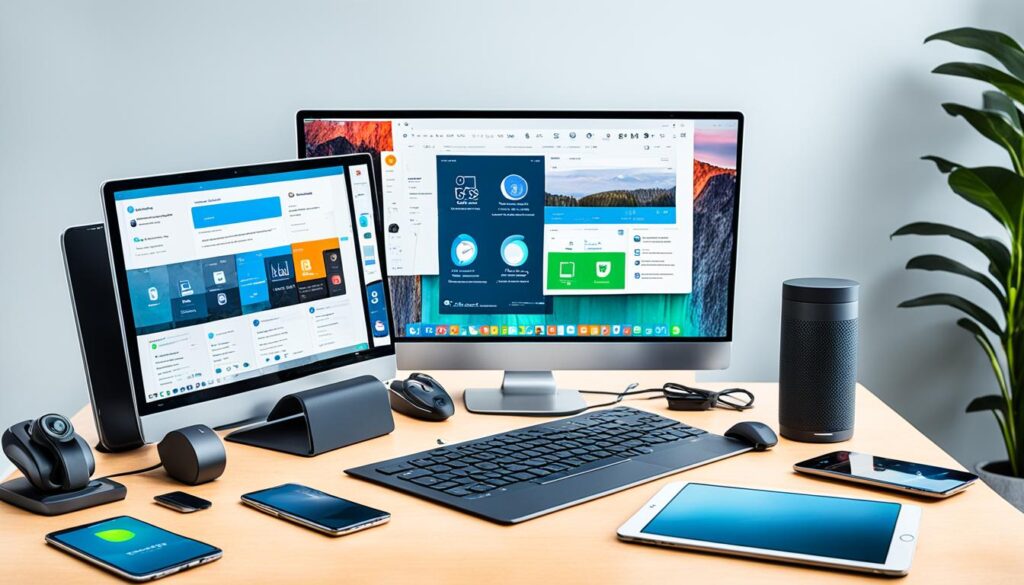Are your work from home policies prioritizing fair employee tracking?
As remote work continues to gain popularity, companies need to ensure that their policies support fair employee tracking. The rise of telecommuting has brought about numerous benefits for both employees and businesses, such as increased productivity and work-life balance. However, it has also raised questions about how to effectively track and monitor remote employees.

In this article, we will explore the importance of setting up work from home policies that prioritize fair employee tracking. We will discuss how remote work guidelines and telecommuting regulations can help businesses maintain transparency and accountability in their flexible work arrangements. Additionally, we will provide insights on defining clear policies within your company to ensure consistency and fairness.
Join us as we delve into the world of remote work policies and discover how you can create a work environment where trust and productivity go hand in hand.
Key Takeaways:
- Setting up work from home policies that prioritize fair employee tracking is crucial in remote work environments.
- Remote work guidelines and telecommuting regulations can help businesses maintain transparency and accountability.
- Defining clear policies within your company ensures consistency and fairness in remote work arrangements.
- Creating a work environment that promotes trust and productivity is essential for remote team success.
- By implementing fair employee tracking practices, companies can foster a positive remote work culture.
The Rise of Remote Work and Its Implications for Businesses
In recent years, there has been a significant rise in remote work, revolutionizing the way businesses operate. The advent of technology and the increasing demand for flexible work arrangements have contributed to the growing popularity of virtual employment. This trend towards remote work brings both opportunities and challenges for businesses, requiring them to adapt and evolve.
The Current Trend Towards Virtual Employment
The virtual employment trend has seen a remarkable surge, driven by the advantages it offers to both employees and employers. Remote work allows businesses to tap into a global talent pool, enabling access to highly skilled professionals regardless of geographical boundaries. This trend not only enhances diversity and inclusivity in the workforce but also reduces costs associated with physical office spaces.
Moreover, virtual employment promotes better work-life balance, as employees gain the flexibility to create their own schedules and eliminate the need for long commutes. This flexibility has been particularly beneficial during the COVID-19 pandemic, enabling businesses to continue operations while ensuring the safety of their employees.
However, it is crucial for businesses to navigate the challenges associated with remote work effectively. The absence of face-to-face interactions can impact communication and collaboration, requiring businesses to adopt innovative strategies to maintain productivity and team cohesion.
Adapting to Flexible Work Arrangements in the Philippines
The Philippines has embraced the rise of remote work, recognizing its potential to address various socio-economic challenges. With a large number of skilled workers in the country, businesses are capitalizing on the opportunity to tap into this talent pool by offering flexible work arrangements.
Adapting to flexible work arrangements in the Philippines requires businesses to consider the unique considerations and circumstances specific to the country. Factors such as reliable internet connectivity, adequate technological infrastructure, and accommodating workspaces are essential for enabling successful remote work.
Furthermore, businesses must prioritize communication and collaboration tools to ensure efficient workflow and effective coordination among remote teams. Project management software, video conferencing platforms, and instant messaging applications play a crucial role in maintaining communication channels and fostering collaboration in virtual work environments.
To further support the growth of remote work in the Philippines, collaboration between the government, businesses, and educational institutions is essential. By aligning efforts and providing necessary support, the country can continue to thrive in the remote work landscape.
| Benefits of Remote Work in the Philippines | Challenges of Remote Work in the Philippines |
|---|---|
|
|
Defining Work from Home Policies Within Your Company
In order to establish effective work from home policies within your company, it is essential to consider several key elements. By defining clear guidelines and expectations, you can ensure consistency and fairness in remote work arrangements. The following factors should be taken into account:
- Eligibility criteria: Determine which employees are eligible for remote work based on job roles, performance records, and individual circumstances.
- Approval processes: Establish a transparent and streamlined process for employees to request and receive approval for work from home arrangements.
- Equipment and technology requirements: Specify the necessary equipment, software, and internet connection standards employees must have in order to effectively work from home.
- Communication guidelines: Define preferred communication channels, response time expectations, and protocols for virtual meetings and collaboration.
- Availability and work hour expectations: Clearly outline the expected work hours, break times, and availability for virtual team meetings or client interactions.
By addressing these aspects, you can ensure that your work from home policies are comprehensive and well-defined. This will contribute to a positive remote work experience and optimize productivity for your distributed workforce.

Ensuring Equal Opportunity Through Telework Agreements
Telework agreements are essential for promoting equal opportunity in remote work. By establishing objective criteria for remote work eligibility and cultivating trust in the remote work environment, companies can create a level playing field for all employees.
Objective Criteria for Remote Work Eligibility
Setting clear and objective criteria for remote work eligibility is crucial to ensure fairness and avoid bias. Companies should establish transparent guidelines that focus on job-related factors rather than personal circumstances. Objective criteria may include:
- Job roles that are suitable for remote work
- Demonstrated performance and productivity
- Availability of necessary technology and equipment
- Effective communication and collaboration skills
- Adherence to company policies and guidelines
By basing eligibility on these objective criteria, companies can provide equal opportunities for all employees and reduce the potential for discrimination.
Cultivating Trust and Avoiding Bias
Trust is a vital component of successful remote work arrangements. Employers should foster an environment of trust by:
- Clear communication: Regularly update employees on company goals, expectations, and changes in policies.
- Supportive management: Provide guidance and resources to help employees succeed in their remote work.
- Feedback and recognition: Recognize and appreciate employees’ contributions, providing constructive feedback to help them improve.
- Open dialogue: Encourage employees to voice their concerns, provide suggestions, and address any challenges they may face.
By cultivating trust, employers can mitigate the risks of bias and promote a positive remote work culture where all employees feel valued and supported.
| Benefits of Ensuring Equal Opportunity in Remote Work | Challenges of Ensuring Equal Opportunity in Remote Work |
|---|---|
|
|
Tools and Strategies for Productive Telecommuting
In order to achieve productive remote work, it’s essential to leverage the right tools and strategies. These tools can enhance communication, collaboration, project management, and task organization, ensuring seamless workflow and efficient work management. Let’s explore some key tools and strategies that can support your telecommuting efforts.
Project Management and Collaboration Technologies
Project management software and collaboration technologies are essential for remote teams to stay organized and effectively collaborate on tasks and projects. These tools provide a centralized platform where team members can create, assign, and track tasks, set deadlines, share relevant files, and communicate in real-time. They enable transparency, accountability, and efficient project execution. Some popular project management and collaboration tools include:
- Trello: A visual project management tool that uses boards, lists, and cards to organize tasks and track progress.
- Asana: A versatile project management platform that allows teams to plan, track, and manage tasks and projects with ease.
- Slack: A team communication tool that offers channels, direct messaging, file sharing, and integration with various other apps for seamless collaboration.
- Microsoft Teams: A comprehensive collaboration hub that combines chat, video meetings, file sharing, and project management features.
By incorporating these project management and collaboration technologies into your remote work routine, you can streamline workflows, facilitate effective communication, and ensure project success.
Time Tracking and Task Organization Software
Efficient time management is crucial for productive remote work. Time tracking and task organization software can help you stay focused, manage your workload effectively, and meet project deadlines. These tools provide features like time logging, task prioritization, and progress tracking. They enable you to allocate time wisely, identify time-consuming tasks, and optimize your work routine. Some popular time tracking and task organization software includes:
- RescueTime: A time tracking tool that provides insights into your daily activities, helping you understand how you spend your time and optimize productivity.
- Todoist: A task management tool that allows you to create to-do lists, set deadlines, and track progress on individual tasks and projects.
- TickTick: A comprehensive task management app that helps you stay organized, manage deadlines, and collaborate with others effectively.
- ClickUp: A versatile project management platform that offers time tracking features, task lists, and project management functionalities in one centralized application.
By utilizing time tracking and task organization software, you can effectively manage your workload, prioritize tasks, and enhance your remote work productivity.

In conclusion, utilizing project management and collaboration technologies, as well as time tracking and task organization software, can significantly enhance your productivity while telecommuting. These tools promote effective communication, streamline project management, and ensure efficient task organization. By incorporating these tools into your remote work routine, you can overcome the challenges of working remotely and achieve optimal productivity.
Creating a Culture of Accountability in Remote Teams
Setting Performance Expectations
In remote work environments, it is essential to establish clear performance expectations to foster a culture of accountability. By defining specific goals and objectives, remote team members have a clear understanding of what is expected of them and can align their efforts accordingly. When setting performance expectations, consider factors such as project deadlines, quality standards, and key performance indicators (KPIs) that are relevant to each team member’s role.
Communicate these expectations through regular team meetings, individual check-ins, and written documentation to ensure consistent understanding across the team. Transparency is key in remote team management, as it allows team members to track their progress and identify areas where improvement is needed. When performance expectations are explicitly communicated and regularly reinforced, remote team members are more likely to take ownership of their work and strive for excellence.
Feedback Mechanisms and Regular Check-Ins
Feedback mechanisms and regular check-ins play a crucial role in maintaining accountability in remote teams. Providing timely and constructive feedback helps remote team members understand how their performance aligns with expectations and enables them to make necessary improvements. Regular check-ins can be conducted through video calls, phone calls, or instant messaging platforms, allowing team leaders to address any concerns, offer guidance, and provide recognition for achievements.
Feedback and check-ins should not be limited to performance assessments alone. It is essential to create an environment where open and honest communication is encouraged, allowing team members to share their challenges, suggestions, and ideas freely. By fostering a culture of constructive feedback and continuous improvement, remote teams can enhance accountability, productivity, and overall team performance.
Benefits of Creating a Culture of Accountability in Remote Teams
| Benefits | Description |
|---|---|
| Increased Productivity | Clear performance expectations and regular feedback help remote team members stay focused and motivated. |
| Improved Quality | Setting high standards and providing feedback ensures that remote team members consistently deliver high-quality work. |
| Enhanced Collaboration | A culture of accountability fosters effective communication and collaboration among remote team members, promoting teamwork and synergy. |
| Employee Growth | Regular feedback and check-ins provide remote team members with opportunities for development and career progression. |
| Increased Job Satisfaction | When remote team members are aware of their performance expectations and receive regular feedback, they feel valued and satisfied in their roles. |
Creating a culture of accountability in remote teams requires consistent effort and effective communication. By setting performance expectations, implementing feedback mechanisms, and conducting regular check-ins, remote team leaders can foster a productive and accountable work environment. This ultimately leads to improved team performance, enhanced collaboration, and increased employee satisfaction.
Respecting Privacy While Tracking Remote Employees
In the era of remote work, employers face the challenge of monitoring their employees’ productivity while respecting their privacy. It is essential to strike a balance between accountability and maintaining a sense of trust and privacy among remote teams.
Transparency in Monitoring Practices
One way to ensure privacy in remote work is by implementing transparency in monitoring practices. This involves clearly communicating to employees the methods and tools used for tracking their work activities, as well as the purpose behind it. By being open about the monitoring measures in place, employers can foster trust and minimize concerns about invasion of privacy.
Transparency can be achieved through:
- Providing employees with a comprehensive overview of the monitoring systems and software used, emphasizing the focus on productivity rather than invasive surveillance.
- Clearly stating the expectations regarding work hours, availability, and communication during remote work.
- Ensuring employees have access to policies and guidelines related to monitoring and privacy.
By being transparent, employers can address any potential doubts or misconceptions employees might have, enhancing their understanding and cooperation.
Legal Considerations in Employee Surveillance
Employers must also consider the legal aspects of employee surveillance in remote work settings. It is crucial to adhere to applicable laws and regulations to avoid violating employees’ privacy rights.
Some important legal considerations include:
- Consulting with legal experts or HR professionals familiar with remote work laws in your jurisdiction to ensure compliance.
- Creating clear and concise policies that outline the organization’s rights and responsibilities regarding employee monitoring.
- Obtaining informed consent from employees for monitoring and clearly informing them of the extent and purpose of the collected data.
- Ensuring the confidentiality and secure handling of employees’ personal information and data collected through monitoring.
By taking these legal considerations into account, employers can mitigate legal risks and protect both their employees’ privacy and their own interests.
Respecting privacy while tracking remote employees is essential for maintaining a harmonious work environment and ensuring the trust and engagement of employees. Implementing transparency in monitoring practices and following legal guidelines can create a sense of balance and foster a culture of privacy and productivity in remote work.

Home Office Rules to Maintain Professional Standards
When working remotely, it’s crucial to establish and adhere to home office rules that uphold professional standards. Creating a dedicated workspace and following guidelines for effective communication can greatly contribute to your productivity and overall success. Here are some essential home office rules and guidelines to consider:
Create an Ergonomic Workspace
To maintain your physical well-being while working from home, it’s important to set up an ergonomic workspace. Ensure that your chair, desk, and computer are all positioned properly to support good posture and minimize strain on your body. Take regular breaks to stretch and avoid sitting in one position for extended periods.
Establish Clear Communication Protocols
Effective communication is key in remote work settings. Establish clear communication protocols with your team to maintain open lines of communication. This includes determining the most efficient modes of communication (such as email, instant messaging, or video conferencing) and setting expectations regarding response times and availability.
Maintain a Professional Demeanor
Even though you’re working from home, it’s important to maintain a professional demeanor. Dress appropriately, as if you were going to the office, to help create a productive mindset. Avoid distractions during work hours, and communicate with colleagues and clients in a professional manner. Always act in a manner that upholds your company’s values and reputation.
Minimize Distractions
Working from home can come with various distractions. Establish rules to minimize these distractions during work hours. This may include setting boundaries with family members or roommates, creating a quiet work environment, and using productivity tools to stay focused and organized.
Take Regular Breaks
It’s important to prioritize self-care and well-being while working remotely. Take regular breaks to recharge and avoid burnout. Use this time to stretch, exercise, or engage in activities that help you relax and maintain a healthy work-life balance.
Stick to Scheduled Work Hours
One of the benefits of remote work is flexibility, but it’s still important to establish and adhere to scheduled work hours. This helps maintain a routine and enables effective collaboration with colleagues in different time zones. Be mindful of your availability and communicate any adjustments to your work hours with your team.
By following these home office rules and guidelines, you can maintain professional standards while working remotely. These practices contribute to a positive work environment and support your productivity and success in remote work arrangements.
Monitoring Productivity Without Micromanaging
In remote work environments, monitoring employee productivity is crucial for maintaining high performance and ensuring tasks are completed effectively. However, micromanaging can create a negative work culture and hinder employee motivation. Instead, businesses should adopt strategies that focus on output-based assessment and provide positive reinforcement and growth opportunities.
One effective approach is to shift the focus from constant surveillance to evaluating the outcomes of employees’ work. By setting clear goals and expectations, managers can measure productivity based on the quality and results of completed tasks. This approach promotes autonomy and empowers remote workers to manage their time and deliverables effectively.
Moreover, positive reinforcement plays a vital role in increasing remote work performance. Recognizing and celebrating employees’ achievements boosts their morale and motivation. Managers can provide regular feedback and acknowledgment, whether through private messages, group communications, or public recognition platforms.
Additionally, providing growth opportunities is essential for remote employees to feel valued and invested in their professional development. This can include offering training programs, educational resources, mentoring, or assigning challenging tasks that encourage skill-building and career advancement.
By monitoring productivity without micromanaging and focusing on output-based assessment, businesses can create a positive and empowering remote work environment. Implementing strategies centered on positive reinforcement and growth opportunities fosters employee engagement, satisfaction, and ultimately drives success in remote work settings.
Adapting Communication Guidelines for Virtual Teams
In today’s remote work landscape, effective communication is crucial for the success of virtual teams. Adapting communication guidelines tailored to the needs of remote teams can significantly enhance collaboration, productivity, and employee satisfaction. In this section, we will discuss strategies and tools that facilitate effective communication in remote work environments.
One essential aspect of remote team communication is the use of video conferencing tools. Utilizing platforms such as Zoom, Microsoft Teams, or Google Meet enables face-to-face interactions, fosters better engagement, and promotes a sense of connection among team members. Visual cues and non-verbal communication greatly enhance the effectiveness of virtual meetings and enable a more personal connection within the team.
To facilitate quick and efficient day-to-day communication, teams can leverage chat platforms like Slack or Microsoft Teams. These tools provide a space for real-time messaging, making it easy to ask questions, share updates, and collaborate on projects. By using dedicated chat channels for different topics or departments, team members can maintain organized and focused discussions.
Clear communication protocols should also be established to ensure that remote team members understand expectations regarding response times, availability windows, and preferred methods of communication. Mutual agreement on communication norms helps in avoiding misunderstandings, minimizes delays, and promotes effective collaboration across different time zones and work schedules.
In conclusion, adapting communication guidelines for virtual teams is essential for promoting effective collaboration, productivity, and employee satisfaction in remote work environments. By utilizing video conferencing tools, chat platforms, and establishing clear communication protocols, businesses can overcome communication barriers and create a cohesive and connected remote team.
Security Protocols for Safeguarding Company Data
In today’s remote work environment, ensuring the security of company data is of utmost importance. Implementing robust security protocols is crucial to safeguard sensitive information from unauthorized access and potential data breaches. By adopting strong data protection measures, businesses can mitigate cybersecurity risks and maintain the confidentiality and integrity of their data.
One fundamental security protocol for remote work is establishing secure network connections. Encrypted virtual private networks (VPNs) can provide a secure channel for remote employees to access company resources. VPNs encrypt data transmitted between the employee’s device and the company’s network, making it more challenging for cybercriminals to intercept and exploit information.
Another critical measure is implementing two-factor authentication (2FA). With 2FA, employees are required to provide an additional layer of verification, such as a unique code sent to their mobile devices, in addition to their username and password. This extra step adds an additional level of security, reducing the risk of unauthorized access even if a password is compromised.

Encryption is also essential for protecting sensitive data during remote work. Encrypting files and email attachments ensures that even if they are intercepted, the information remains unreadable to unauthorized parties. Encrypted file sharing platforms can provide secure channels for sharing documents and maintaining control over file access and permissions.
Furthermore, regularly updating software and operating systems is essential for remote work cybersecurity. Software updates often include security patches and fixes for vulnerabilities, reducing the risk of exploitation by cybercriminals. Reminding employees to keep their devices up to date is critical in maintaining a secure work environment.
It is crucial to educate remote employees about cybersecurity best practices and the potential risks they may encounter. Regular training sessions can cover topics such as recognizing phishing emails, using strong passwords, avoiding suspicious websites, and reporting any security incidents promptly. Building a culture of cybersecurity awareness is key to reducing the likelihood of security breaches.
In conclusion, establishing robust security protocols is vital for safeguarding company data in a remote work setting. By prioritizing data protection measures such as secure network connections, two-factor authentication, encryption, and regular software updates, businesses can enhance their remote work cybersecurity and minimize the risk of data breaches. Additionally, educating employees about cybersecurity best practices ensures that they remain vigilant and proactive in maintaining a secure work environment.
Conclusion
In conclusion, formulating a forward-thinking remote work policy is crucial in today’s evolving work landscape. As businesses adapt to the rise of remote work and flexible work arrangements, it is essential to establish policies that prioritize fair employee tracking while promoting productivity and accountability.
Key takeaways from this article include the importance of defining work from home policies within your company, ensuring equal opportunity through telework agreements, and utilizing tools and strategies for productive telecommuting. By implementing these practices, businesses can create a positive remote work environment that supports employee success.
For Filipino employees, it is crucial to tailor remote work policies to meet their unique needs and challenges. Providing the necessary support and resources for their success in telecommuting will not only help them thrive in their roles but also contribute to the overall success of the organization.
In this ever-changing work landscape, it is important to continuously review and update remote work policies to ensure they remain future-proof. By staying adaptable and considering the evolving needs of employees, businesses can foster a culture of remote work that enables both productivity and employee satisfaction.
FAQ
What are work from home policies?
Work from home policies are guidelines and regulations that companies establish to govern remote work arrangements. These policies outline the expectations and requirements for employees who work from home, including eligibility criteria, communication guidelines, work hour expectations, and equipment requirements.
What are the benefits of remote work?
Remote work offers several benefits for both employees and employers. It provides flexibility in work hours and location, improves work-life balance, reduces commuting time and costs, and increases employee productivity and job satisfaction. For employers, remote work can lead to cost savings, access to a larger talent pool, improved employee retention, and increased organizational resilience.
How are businesses in the Philippines adapting to flexible work arrangements?
Many businesses in the Philippines are embracing flexible work arrangements, including remote work. This adaptation is driven by factors such as traffic congestion in major cities, the desire to attract and retain top talent, and advancements in technology that enable remote collaboration. Companies are implementing work from home policies, providing necessary equipment and technology, and establishing communication guidelines specific to remote work.
What elements should be considered when defining work from home policies?
When defining work from home policies, it is important to consider factors such as eligibility criteria, approval processes, equipment and technology requirements, communication guidelines, and availability and work hour expectations. These elements help establish clear guidelines and expectations, ensuring fairness and consistency in remote work arrangements.
How can employers ensure equal opportunity in remote work?
Employers can ensure equal opportunity in remote work by establishing telework agreements that set objective criteria for remote work eligibility. This helps avoid bias and discrimination. Cultivating trust between employers and employees is also crucial in fostering a positive remote work environment.
What tools and strategies can enhance productivity in remote work?
Project management and collaboration technologies are essential tools in facilitating effective remote work. These tools enable seamless communication, file sharing, and task organization. Time tracking and task management software can also help ensure efficient work management in remote settings.
How can employers create a culture of accountability in remote teams?
Employers can create a culture of accountability in remote teams by setting clear performance expectations and effectively communicating them to remote employees. Feedback mechanisms and regular check-ins play a crucial role in maintaining accountability and supporting remote team success.
How can employers respect privacy while tracking remote employees?
Employers can respect privacy while tracking remote employees by maintaining transparency in monitoring practices. It is essential to ensure employees are aware of the monitoring measures in place. Additionally, employers must adhere to legal considerations and compliance requirements related to employee surveillance in remote work settings.
What are some home office rules that can help maintain professional standards in remote work?
Home office rules that help maintain professional standards in remote work include guidelines for setting up an ergonomic workspace, establishing appropriate communication protocols, and maintaining a professional demeanor while working from home.
How can employers monitor productivity in remote work without micromanaging?
Employers can monitor productivity in remote work by focusing on output-based assessment rather than constant surveillance. Positive reinforcement and providing growth opportunities for remote employees can also enhance productivity without resorting to micromanagement.
What strategies can enhance communication in virtual teams?
Adapting communication guidelines for virtual teams is essential. This may involve using video conferencing tools, utilizing chat platforms for real-time communication, and establishing clear communication protocols. Strong communication practices enhance collaboration and productivity in remote teams.
What security protocols are necessary for safeguarding company data in remote work environments?
Implementing data protection measures, such as secure network connections, two-factor authentication, and encrypted file sharing, is crucial for safeguarding company data in remote work environments. Prioritizing cybersecurity minimizes the risk of data breaches and ensures the confidentiality of sensitive information.
How should employers formulate a forward-thinking remote work policy?
Employers should formulate a forward-thinking remote work policy by considering the key takeaways from this article. The policy should align with the evolving work landscape and address the unique needs and challenges of Filipino employees in telecommuting. Supporting their success in remote work is essential in creating an inclusive and efficient work environment.
